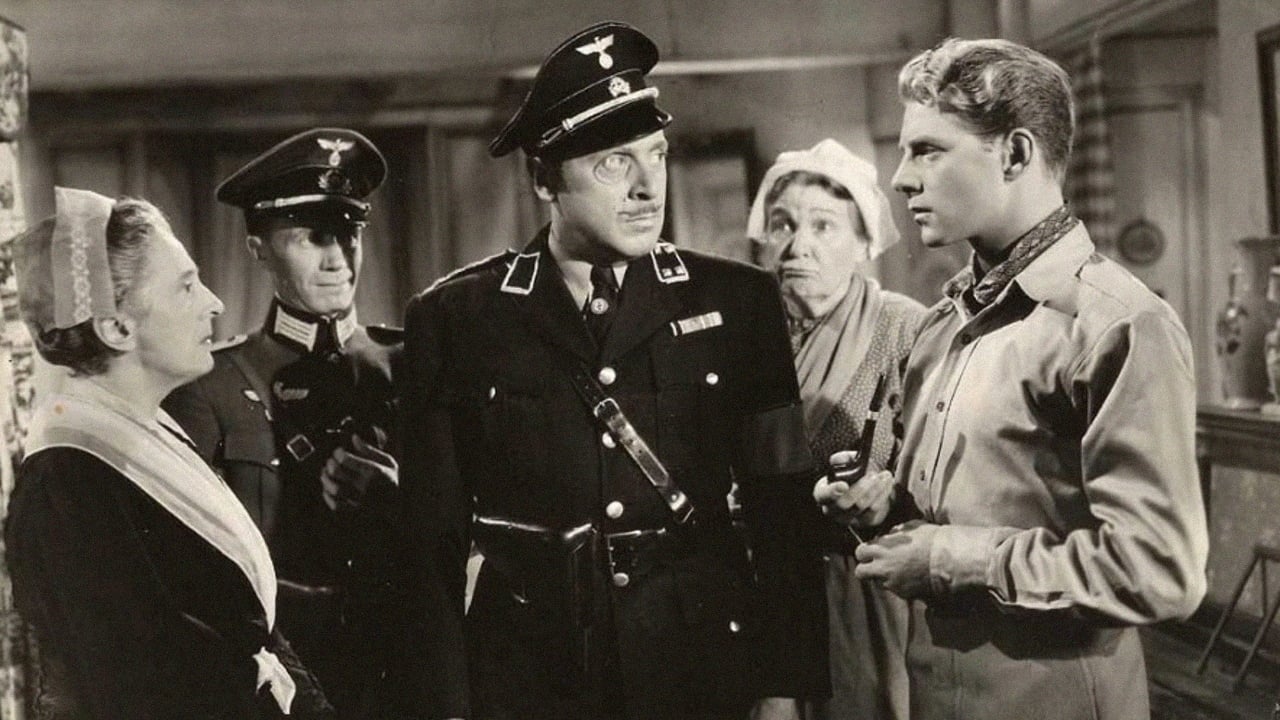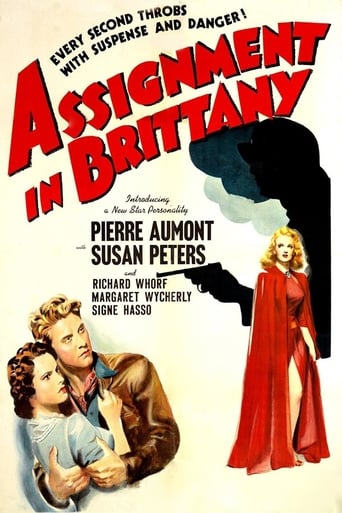Jeanskynebu
the audience applauded
SpecialsTarget
Disturbing yet enthralling
Kirandeep Yoder
The joyful confection is coated in a sparkly gloss, bright enough to gleam from the darkest, most cynical corners.
SimonJack
This is a Hollywood movie made in the middle of World War II. It's a very good portrayal of British and French undercover work during the war, as well as of the French underground. To it's credit, it also shows the betrayal of some of the French, including a double agent and traitors among the underground. The French underground contributed to the Allied efforts against Germany in WW II. But the country also saw a significant collaboration with the Nazis, in the Vichy government, socializing with the Germans, and spies and double agents in the underground. At the time "Assignment in Brittany" was being made, Germany's blockade of the Atlantic was in place. By the end of 1943, when it had ended - due to loss of ships and air support, the Germans had sunk 3,500 merchant ships enroute to the United Kingdom and Russia. Some 175 Allied war ships also had been sunk. Germany lost 783 U-boats and 47 surface ships. There wasn't a specific U-boat base on the coast of France that had to be knocked out, as this movie shows. Rather, Allied bombing raids hit several ports from which U-boats operated. But, most of the U-boat losses were from Allied aircraft and convoy escort ships. The Atlantic battle was one of attrition in which the Allies outlasted the Germans with superior naval power combined with a blockade of Germany from it's Baltic Sea ports. This film has some good action toward the end,. But its best aspect is the portrayal of the French underground and people during the German occupation. The story is an interesting one. Considering that MGM had to shoot the movie on its Hollywood studios, the film has a realistic feel as though it's taking place in Brittany France during the war. The cast all do a fine job and the film quality and production are good. This was the American film debut of both Jean-Pierre Aumont and Signe Hasso. He is Capt. Pierre Metard in the French Army, and goes undercover back into France as a look-alike, Bertrand Corlay. His duty is to pinpoint the hidden German U-boat base so that the Allies can attack and destroy it. The story has an element of romance, but not the obviously usual type that Hollywood inserts to increase appeal for a film. Here are a couple of interesting lines from the movie. Corlay and a schoolteacher, Jean Kerenor (played by Richard Whorf) are going into the town pub when a German guard stops them. Kerenor says, "One uncovers. It's good form for the content." They take their hats off and enter, where town men and German officers are seated at tables. But all others are wearing their hats.To Metard, who impersonates her son, Madame Henriette Corlay says, "There are women, monsieur, who give their love but once. I think Ann's one of them. When you go..." Capt. Metard, "It's not I she loves... it's your son." Mme. Corlay, "I don't think you believe that. Monsieur, don't make her suffer any more."
shoobe01-1
Solid story, I think well done and paced nicely for modern sensibilities even. Dramatic scenes jump to quite harrowing action without warning, and play out realistically. A relatively simple, high-stakes spy/war plot, clearly resolved. Nice bits of play acting, being discovered, double agents, etc. etc. Some here complain about the acting, but I thought it all worked great, and the supporting cast really held up their end; even people on screen for two minutes seem real, and to be motivated by actual emotion. Not a great transfer, and hard to watch but I caught it on TCM. Nicely done sets, and mostly works within the confines of budget by keeping things indoors and at night. The few outdoor scenes (especially those in the day) are a bit lame in the backlot/studio way they were, but that's about the only flaw I can find in it.
dodi207
I can't remember the exact year, but my mother and I were invited to an evening at the Uptown Theatre in Toronto, Ontario for a special screening of Assignment in Brittany in aid of the Free French movement. It was a very exciting time for me, and Jean Pierre Aumont was there in person. I was 14 or 15 at the time, and I have never forgot the evening. Our tickets were a gift from a french teacher at the Cental High School of Commerce. It was a gala evening, in spite of the fact that war was raging in Europe and the Pacific. I was of an age when I was entranced by movie stars, and to see Mr. Aumont in person was a dream come true. I wonder if there are others who attended that show. Mr. Aumont was introduced, and spoke at length about the Free French movement, and encouraged donations to support them. I enjoyed the picture very much, as did my mother. There was a reception after the screening, where we were introduced to Mr. Aumont, a very gracious man. Perhaps it was the fact that the war had been on for it seemed forever, and the picture showed what ordinary citizens could do to help defeat the enemy. Certainly, although we did not suffer the devastation of actually being occupied or bombed, we were well aware of the loss of our dear family and friends. There were many films made about the war but this seemed special because of the appearance of people who had direct connection with the Free French movement, and we were hearing about it first hand.
richardann
This picture has the look and feel of a British film of the period, probably because it includes mainly actors who spent WWII in Hollywood under contract to MGM. Jean-Pierre Aumont and his colleagues show their previous training on stage through too large gestures and reactions. Also, the acting often looks as if war were a lot of fun.Aumont is incredibly handsome but seems wasted in this two-dimensional portrayal of a Free French warrior. The picture no doubt bolstered the spirits of his fans, dramatizing the efforts of the Free French at a crucial time in history. Any authenticity in his character comes from the knowledge that he did indeed serve with the Free French, for which he was later decorated by the French government.The best acting in the film is by the naturalistic Susan Peters and the classically trained Margaret Wycherly. Nevertheless, the picture is worth seeing for its place in the history of movie making.


